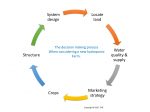What type of crops are suitable for hydroponics
Although most crops can be grown in some derivative of a hydroponic system, not all crops can be grown successfully on a commercial scale throughout the year. If you want to start your hydroponic system on a small scale initially, read this ebook by A.J. Clarke. You will quickly know if commercial hydroponics is in your blood or not. Commercially suitable crops should have the following characteristics:
- Should have a high value.
- Value must be added to the product.
- Should provide high yields per unit area or short growth cycle.
- There should be a significant quality difference (either quality or yield) between the hydroponically grown products vs. the open field grown product.
- Open field production should not be possible out of season.
- The harvestable product must be above the soil surface.
- The demand should be large enough to sustain the production system.
A comparison of the top 20 vegetables sold on 15 of the National Fresh Produce Markets in South Africa has shown that seven vegetables are suitable for commercial hydroponic vegetable production throughout the year. Note that one can grow potatoes in a hydroponic system, but it will not be economical.
Vegetables suitable for commercial hydroponics are:
- Tomatoes
- Lettuce
- Green beans (Climbing bean)
- Peppers (all colours)
- Spinach
- English Cucumbers &
- Marrows.
Crops not suitable for commercial hydroponics are:
- Potatoes
- Onions (too long growing season)
- Cabbage (price too low per unit to compete with soil grown)
- Carrots (Will only work in ebb and flow technique and is very expensive)
- Pumpkins, Hubbard squash, gem squash
- Sweet potatoes
- Beet root (low value per unit sold)
- Cauliflower
- Green maize
- Green peas
- Turnips
Other vegetables such as Radicchio (well suited for hydroponics) and baby peppers are also grown in hydroponic systems but are not sold on the National Fresh Produce Markets in large quantities and amounts supplied are not available. In most cases these specialty crops are sold directly to other markets such as chain stores, hotels and restaurants.
Although the above table indicates that onions are not economical to grow in hydroponic systems, it does not imply that a very high-quality product cannot be harvested. The reason that these two crops are not economical is that they compete with conventional farming systems. Commercial onion farmers have at least 20-80 ha under irrigation. Another reason is onions are a day light sensitive crop and the growing season length cannot be manipulated significantly by improving the growing conditions. The growth season length for onions is too long to be viable in hydroponic systems.




